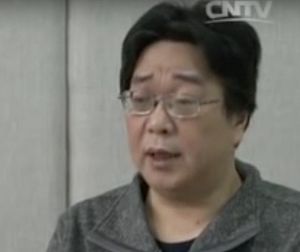Swedish citizen Gui Minhai — the Hong Kong bookseller who disappeared in 2015 and resurfaced on the Chinese mainland under police custody, before being released in October 2017 — was seized by Chinese authorities again last weekend. Gui’s latest arrest was no less dramatic than his last disappearance.
Gui’s daughter, Angela Gui, told New York Times that her father was on a train bound for Beijing from Ningbo when about ten plainclothes Chinese police officers grabbed Gui Minhai right in front of two Swedish diplomats and took him away.
“I presume it must have been quite a scene,” she said.
The two diplomats, from the Swedish Consulate in Shanghai, were accompanying Gui to the Swedish Embassy located in Beijing for a medical examination, since Gui “showed symptoms of amyotrophic lateral sclerosis, also called A.L.S.,” New York Times reported. (ALS, or Lou Gehrig’s disease, is a progressive disease that affects nerves in people’s brain and spinal cord resulting in muscle weakness and atrophy.)
The dramatic incident abroad the train has been confirmed by the Swedish government. On January 23, Swedish Minister for Foreign Affairs Margot Wallström released a statement on the foreign ministry’s website, demanding an explanation and the immediate release of Gui — a rare move for the Swedish government.
“We take a very serious view of the detention on Saturday of Swedish citizen Gui Minhai, with no specific reason being given for the detention, which took place during an ongoing consular support mission,” the statement said.
Wallström continued:
The Chinese authorities have assured us on numerous occasions that Mr. Gui Minhai has been free since his release having served a sentence for a traffic-related offense, and that we can have any contact we wish with our fellow citizen. We expect the immediate release of our fellow citizen, and that he be given the opportunity to meet Swedish diplomatic and medical staff.
The statement also revealed that China’s ambassador in Stockholm has been summoned twice over the incident.
According to the South China Morning Post, Chinese foreign ministry spokeswoman Hua Chunying responded to the incident at the regular press briefing on January 23.
“This is not a matter handled by the foreign ministry. I am not familiar with the situation,” she said. “You can inquire with related departments. I believe the relevant departments will handle the situation in accordance with the law.”
SCMP reported that, when pressed as to whether Gui had violated any law in China or whether he was allowed access to Swedish embassy officials, Hua said: “China has always provided convenience and facilitation to officials at foreign embassies or consulates in accordance with international laws, including the Vienna Convention on Diplomatic Relations, and Chinese law.”
“At the same time, any foreigners in China, including officials at the foreign embassies or consulates in China, should not violate international law or Chinese law,” she added.
Based on Hua’s comments as well as the scope of the incident, it’s highly likely that it’s China’s state security agency has been handling the matter, without consulting the foreign ministry.
However, none Hua’s comments above were included in the transcript of the press briefing — a usual move by the foreign ministry when information is deemed too “sensitive.”
Woo Chih-wai, one of Gui’s friends, told the South China Morning Post that Gui was released in October on the condition that “he not leave the city limits of Ningbo.” Woo also surmised that Gui might have been trying to get to Beijing with Swedish officials to gain sanctuary in the embassy.
The New York Times reported that “After Mr. Gui was taken away, Chinese officials told Swedish diplomats that he was suspected of sharing secret information with Swedish diplomats and of meeting them illegally. ” But this piece of information wasn’t directly confirmed by Wallström’s official statement.
Yet Gui’s friend Bei Ling, a dissident poet and the co-founder of the Independent Chinese PEN Center, further analyzed New York Times’ information. He said on Twitter:
There could only be one piece of secret information, which is that he has honestly told [the diplomats] how he was brought back to China in late October 2015.
Gui was one of five Hong Kong booksellers who disappeared in 2015 and reappeared in the Chinese mainland under police custody. The incident triggered a huge wave of protest against the Chinese government in Hong Kong. It is widely believed that the Chinese authorities detained Gui for publishing “forbidden” books on Chinese President Xi Jinping and other Communist Party leaders. But the Chinese government said Gui turned himself in to answer for a drunk-driving conviction 11 years ago. Gui himself later also showed up on a TV program of China’s state-run CCTV and admitted to the camera that he did voluntarily go back to the Chinese mainland, in what is assumed to be a coerced statement.

































